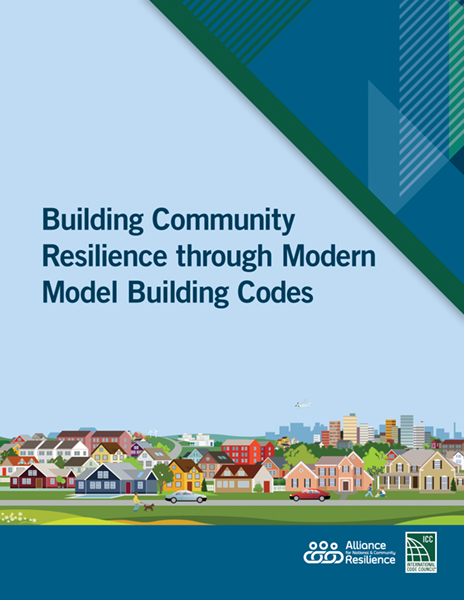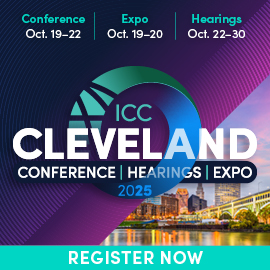Building Community Resilience
Building Community Resilience through Modern Model Building Codes

This publication provides a comprehensive overview of community resilience, what it entails, and why it’s important. In addition to an extensive literature review, the document provides a number of examples of communities with effective pre-disaster mitigation strategies and outlines code provisions from the International Codes that were put in place to mitigate future risk.
Over the past twenty years, the United States has experienced a series of natural and human-caused disasters—events that have significantly impacted its society, economy and culture. Models predict natural disasters will increase in frequency and severity. Further, as populations grow, urban areas expand, and interconnectedness increases, the potential for a disaster event to have deeper and further-reaching consequences also increases. As a result, there is a need to implement measures that increase societal, economic, and cultural resilience—community resilience.
Resiliency is about the ability to plan and prepare for, absorb, recover from, and more successfully adapt to adverse events regardless of whether the subject is an individual or our society, a business or our economy, a single bridge or all critical infrastructure.
When considering what it takes to create resilient communities, it is important to understand that communities function as complex, interconnected “systems of systems,” and that individual systems rarely, if ever, operate in isolation from one another. When an adverse event occurs, all gears in the local “system of systems” must continue to function: this is whole community resilience.
To attain whole community resilience, a community must understand the interconnections between its critical systems, how they might be impacted by adverse events, and how they can make the systems and the community stronger, more adaptable, and more quickly able to recover when disaster strikes. Significant social and economic gains can be made by investing in mitigation to reduce the human and financial losses associated with such events—to make communities safer and more disaster resilient. With respect to natural hazard events alone, a recent National Institute of Building Sciences study demonstrated that for every $1 invested in mitigation from a specific set of hazard mitigation grants, the nation receives $6 in benefits as avoided future losses—a benefit-to-cost ratio of 6 to 1.
Resilience in the built environment starts with strong, regularly adopted, and properly administered building codes. Study after study confirms that adopting and effectively implementing current model building codes is the nation’s best defense against hurricanes, tornadoes, earthquakes, flooding, and other natural disasters. A FEMA analysis from 2014 estimated approximately $500 million in annualized losses avoided in eight southeastern states due to the adoption of modern building codes. Effective and well‐enforced building codes in Missouri have reduced hail damage to homes by 10 to 20 percent on average. And, in the ten years following Florida’s adoption of a statewide building code, the code’s adoption and application reduced windstorm actual losses by as much as 72 percent, producing $6 in reduced loss to $1 of added cost.
Strong building codes save lives and protect people’s homes. They ensure that businesses stay open by minimizing interruptions and damage to property, and they help keep emergency responders safe. They are locally tailored – both through hazard mitigation provisions that tie to a given jurisdiction’s location and land features as well as through the ability of an adopting jurisdiction to amend model codes to reflect local considerations. They are regularly updated to reflect the latest in building science, hazard maps and best practices. Communities cannot be resilient without resilient buildings.
In keeping with its mission to support the health, safety and welfare of communities and their citizens, the International Code Council builds off its strong building safety focus to provide the information and tools to support achievement of whole community resilience. The Code Council is a founding member of the Alliance for National & Community Resilience (ANCR), a 501(c)(3) national coalition of public and private sector stakeholders. ANCR provides the information that communities need to benchmark their current level of resiliency, identify options available to fill gaps and increase resiliency, and to understand the future benefits to be gained by investing in advance of the next hazard event. ANCR’s primary objective is the development of a system of community benchmarks—the first system of its kind in the United States—that will allow local leaders to easily assess and improve their resilience across all functions of a community. ANCR intends to give communities a voluntary, transparent, usable and easily understandable accredited self-assessment that helps to showcase their whole community resilience and to provide a simple gauge of how their resilience continues to strengthen.






